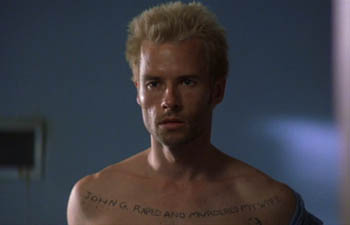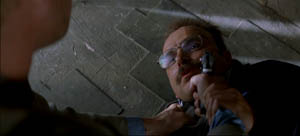|
Quite the audacious film, especially for one's second feature, Memento is the story of a man with anterograde amnesia, (a condition which leaves existing long-term memories undisturbed but robs the individual of the ability to form any new ones) and his attempts to find and avenge himself upon the man who killed his wife and left him in his current debilitated state. Structured in a series of episodes that flow in reverse order of occurrence, the film presents quite an original take on the mystery film genre, as it presents its protagonist's own recent past as the mystery, one which he, unlike the audience, will never be able to solve.  Critics have gone back and forth over whether or not the reversed-order structure of the film is a mere gimmick. Perhaps it is a gimmick. My personal response to that is "big fucking deal." Talkies, color, and widescreen presentations were all gimmicks at one point, designed to lure more viewers into the theaters, which does not mean that they did not also have anything in the way of artistic merit to offer. In the case of Memento, the structure is absolutely essential to the telling of the story. Reverse-ordering the events leaves us in the same-or at least similar-shoes as Leonard Shelby, our main character, as we see events playing out before us while having no knowledge of how we arrived at that point. Unlike him, however, we are required to have rather a good memory for events in order to keep track of what has gone before (or later) as we travel back in time to find out what really happened. Of course, since much of what we learn must come from sources outside of our hero's head, we can never be certain who's telling the truth and who might be playing him for personal ends. One of the things that the film manages to very vividly depict is just how much it would suck not to have any short-term memory. The matter of memory as a necessary attribute of our capacity to function as sentient beings is made stunningly clear by the complete absence of any stunning clarity in the film's progress (or regress). We have little choice but to trust that the filmmaker has, in the end, led us to the correct solution. In between the backward-flowing segments are sandwiched a series of forward-moving snippets of a phone conversation between Leonard and an unknown second party, during the course of which we learn of Leonard's past and his ongoing and seemingly futile pursuit of the phantom killer who robbed him of his life. The other people who float through his life, identified to him only by means of photographs he's labeled with rough-and-ready notes, are enigmas whose motives remain elusive. Loyalties will shift, and shift again. It's all very clever and inspires multiple viewings, which are really necessary in order to get the full picture.  Cleverness aside, it remains true that no film is going to fly for an audience if the characters aren't believable and interesting. The emotions we see here are honest and, over the course of the film, lead us to an understanding of the nature of our main character, and why he is the way he is. The ultimate mystery here, in the end, is "who is Leonard Shelby," and not in some standard melodramatic "He used to be a secret agent or other such crap" way. As he's told more than once in the course of the story, "[Leonard Shelby] is who you were. You don't know who you are." This is where the film succeeds most impressively: it makes us invest emotionally in a man we know virtually nothing about, based only on our subjective interpretations. If you're one of those people who don't like to think when they watch movies, this one will really, really piss you off. Everyone else may feel free to dive in. -review by Matt Murray
|
|
||||||||